Unit 1 Festivals around the world Language Points 导学案3-人教必修3精品
高中英语 必修三 Unit1《Festivals around the world ---Reading》
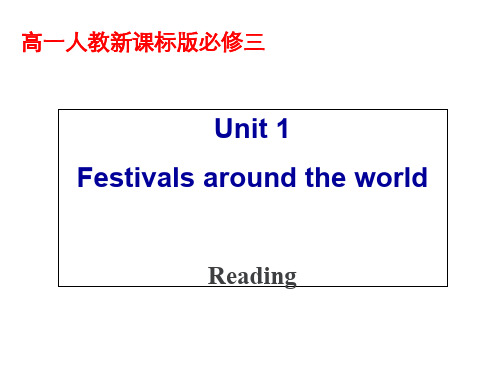
3. Qu Yuan was a great poet who people honor a lot in China. T
4. Mid-autumn Festival is held to celebrate the end of autumn. F
5. Easter celebrates the birth of Jesus. F
高一人教新课标版必修三
Unit 1 Festivals around the world
Reading
Guessing Compition:Guess what festival It is according to the picture you see as quickly as you can.
5. Name three things people do at Spring Festival.
eat dumplings, fish, meat; give children lucky money; dragon dances; visit family members
Festivals of the Dead: Fill in the blanks.
P 2. Festivals of the Dead Japan -----Obon Mexico------Day of the Dead America------Halloween P 3. Festivals to Honour People Dragon Boat Festival Columbus Day (India)October 2
2. Answer the following questions.
1. What are festivals of the dead usually for?
教案4:Unit 1 Festivals around the world
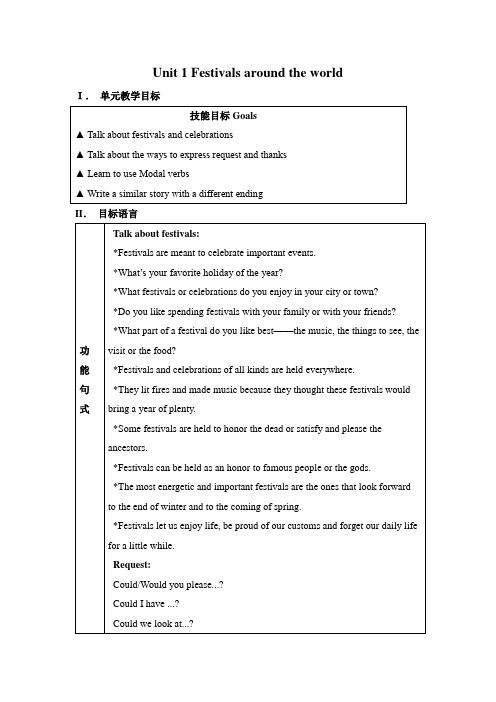
Unit 1 Festivals around the world I.单元教学目标II.目标语言III. 教材分析与教材重组1. 教材分析本单元以节日为话题,介绍古今中外节日的种类、由来、意义以及人们的活动和习俗,旨在通过本单元的学习使学生不但了解我国的节日,而且对外国的节日也有所了解,进而拓展社会文化背景、增加跨国文化知识;使学生复习和巩固运用请求和感谢的表达法,掌握情态动词的用法;并尝试根据阅读的文章写一个不同的结局,能表达自己的观点和想法。
1.1 Warming Up 旨在通过表格引导学生讨论并列举出五个我国节日的日期、庆祝内容和民俗。
可以刚刚过去的春节为话题导入对节日的讨论;使他们由自己的经历谈起,扩展到别的节日以及外国的重要节日,激发学生的兴趣,激活他们关于节日的背景知识,为本单元的学习做准备。
1.2 Pre-reading是Reading 的热身活动。
主要通过两个问题引导学生思考并讨论自己最喜欢的节日及欢度方式,进而了解学生对节日的认识,以便为阅读作好铺垫。
1.3 Reading 的五篇小短文分别介绍古代节日、亡灵节、纪念名人的节日、丰收节、春天的节日等,使学生了解各种节日的由来及其存在的意义。
此部分载有Festivals的重要信息,还呈现了大量的词汇和主要的语法---情态动词的用法。
处理时应作为重点、整体处理,通过上下文来教词汇、语法,并引导学生分析长句、难句和复杂句。
1.4 Comprehending是考察对阅读内容的进一步理解。
练习一:六个问题让学生对文章内容有浅层理解并考察课文细节,但又不能仅仅拘泥于课文,要引导学生理解课文内容的基础上联系现实生活。
练习二:要求学生讨论哪些节日是最重要的,哪些是最有趣的,以表格的形式检查学生对所读节日的理解,并训练他们举一反三的归纳和推理能力。
练习三:要求学生找出各种节日共有的三件事,然后讨论为什么这些事对各地的人们都很重要。
这就要求学生不仅要温习文章内容而且要结合实际,阐述自己的想法,挖掘学生的思维能力和语言表达能力。
高教版(2023)基础模块3 Unit 1 Festivals Around the World 第
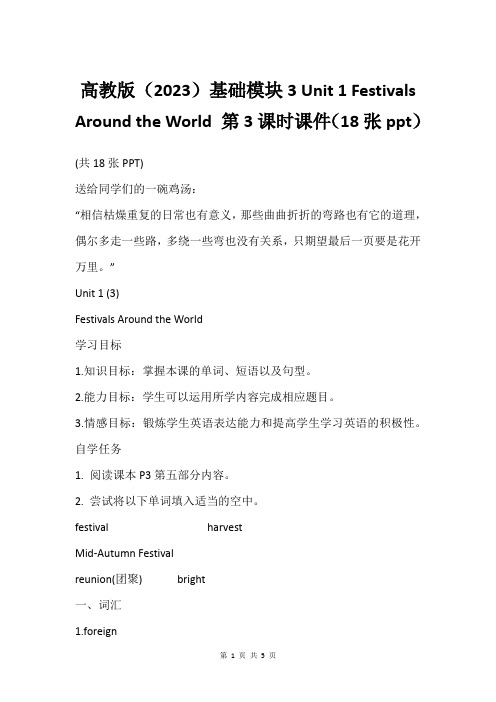
高教版(2023)基础模块3 Unit 1 Festivals Around the World 第3课时课件(18张ppt)(共18张PPT)送给同学们的一碗鸡汤:“相信枯燥重复的日常也有意义,那些曲曲折折的弯路也有它的道理,偶尔多走一些路,多绕一些弯也没有关系,只期望最后一页要是花开万里。
”Unit 1 (3)Festivals Around the World学习目标1.知识目标:掌握本课的单词、短语以及句型。
2.能力目标:学生可以运用所学内容完成相应题目。
3.情感目标:锻炼学生英语表达能力和提高学生学习英语的积极性。
自学任务1. 阅读课本P3第五部分内容。
2. 尝试将以下单词填入适当的空中。
festival harvestMid-Autumn Festivalreunion(团聚) bright一、词汇1.foreignadj.外国的,外来的foreigner【C】n. 外国人,外来人练习造句:他是一名外国学生。
2. vocation n.职业,工作vocational adj. 职业的,职业技术的vocational school:职业学校例:我在一所职业学校上学。
vacation n.假期v.度假summer vacation 暑假winter vacation 寒假go on vacation: 去度假例:我计划暑假去海南度假。
句子练习:1.她是一名职业学校的学生。
2.他的职业是一名警察。
He chose teaching as his _________ vocational B. vocationC. vacationD. vacational3. celebrate v. 庆祝,赞美celebration n. 庆祝,颂扬We had a________ in the hall yesterday.celebrated B. celebrateC. celebratesD. celebration4.familyfamily :“家人” ,不可数名词。
Unit1_Festivals_around_the_world课件

1. Why do we hold festivals of the dead?
Festivals of the dead are usually held to satisfy honour the dead or _________the _________ ancestors.
2.What do people do at these festivals?
People should go to clean the graves and light incense in memory of their ancestors.
Obon(盂兰盆节) in Japan
Obon 盂兰盆节
They also light lamps and play music because they think that this will lead the ancestors back to the earth.
Thanksgiving The third is Harvest and ___________Festivals. China and Japan have Mid-autumn festivals, admire when people ________the moon. The last one is Spring Festivals. They are the most energetic look forward to and important festivals that ______________the end of winter and to the coming of spring. In China, people eat dumplings ________(饺子)and give the children _______money. In Japan ,the country, lucky cherry covered with ________tree flowers ,looks as though it is covered with pink snow.
人教版高中英语必修3 unit1 Festivals around the world 课件

Mexico
Halloween
western countries
Dragon Boat Festival
China
Festivals to Honor People
Columbus Day
USA
Festival to Honor Gandhi
India
Harvest Festivals
Thanksgiving
Unit 1 Festivals around the world
Spring Festival Christmas
Unit 1 Festivals around the world
Tibetan New Year
Unit 1 Festivals around the world
Task 1
Scanning
Easter and some western
carnivals
countries
Cherry Blossom Japan Festival
Kinds of Festivals
Names of Festivals
Countries
Obon
Japan
Festivals of the Dead
Day of the Dead
A. 生病 B. 发疯
C. 受伤 D. 挨饿
2.Which one is used to honour someone?
A. Spring Festival
B. Thanksgiving
C. Dragon Boat Festival
D. Mid-autumn Day
3. Which of the following is not mentioned?
M3 Unit1 festivals around the world word study

Find out the synonyms
take place gather satisfy honor energetic
look forward to have fun with in memory of
Tomb-sweeping Festivals
Translation
每年4月 号是清明节 号是清明节, 每年 月5号是清明节,清明节是为了纪念死 者,缅怀祖先。在那天,家庭成员聚在一起,扫 缅怀祖先。在那天,家庭成员聚在一起, 墓,上供,焚香,祭慰逝者。 上供,焚香,祭慰逝者。 逐渐地,人们为这个传统节日增加了更有 逐渐地, 活力的内容。许多人外出,走进大自然, 活力的内容。许多人外出,走进大自然,希望玩 得开心。 得开心。 节日不仅能让人回想起过去, 节日不仅能让人回想起过去,还能让人享 受现在的生活。 受现在的生活。
Translation
每年4月 号 清明节,清明节是为了纪念 纪念死 每年 月5号是清明节,清明节是为了纪念死 者,缅怀祖先。在那天,家庭成员聚在一起,扫 缅怀祖先。在那天,家庭成员聚在一起, 祖先 聚在一起 墓,上供,焚香,祭慰逝者。 上供,焚香,祭慰逝者。 逝者 逐渐地,人们为这个传统节日增加了更有 逐渐地,人们为这个传统节日增加了更有 活力的内容。许多人外出,走进大自然,希望玩 活力的内容。许多人外出,走进大自然,希望玩 的内容 得开心。 得开心。 节日不仅能让人回想起过去, 节日不仅能让人回想起过去,还能让人享 回想起过去 受现在的生活。 受现在的生活。
Valentine’s Day
So he outlawed(宣布 不合法 marriage for young 宣布…不合法 宣布 不合法) men. Valentine wasn’t satisfied with this. He married (主婚 young couples secretly. When Emperor 主婚) 主婚 Claudius II found out it, he had him put to death. Perhaps we'll never know the true story behind the man named St. Valentine, but February has been the most energetic and important month that many lovers look forward to celebrating love and having fun with each other for a long time, dating clear back to the Middle Ages. In fact, Valentines ranks second only to Christmas in number of greeting cards sent.
Unit1_Festivals_around_the_world_Reading(包括语言点)教材
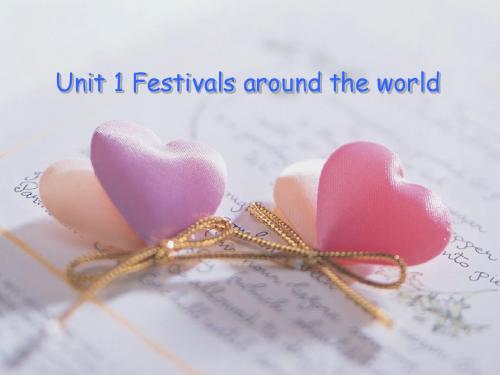
2019/4/23
in/for fun :开玩笑地,为了好玩 make fun of := laugh at 嘲笑,讥笑 have fun with : 和...玩的快乐/ 开心 We had fun with each other at the party held last Sunday. We are playing cards just for fun. fun : n [u] What fun it is to swim in summer!
2019/4/23
in memory of : 纪念,作为…的纪念 = to the memory of sb The museum was built in memory of the famous scientist. 类似短语有: in honor of in favor of in search of in charge of in need of
2019/4/23
award [ə'wɔːd]
n. 奖品,奖项,奖金, 助学金 ……
vt. 授予……裁定……奖励...... award sb sth = award sth to sb Mary got an award and was able to finish her study. She won the best actress award. reward n ,v 报酬,奖金,酬劳,奖赏
Unit1Festivalsaroundtheworld(新课标版高一英语必修三教案教学设计)

Unit 1 Festivals around the world(新课标版高一英语必修三教案教学设计)Unit 1 Festivals around the worldThe First Period (Warming up & Pre-reading)Step One: Lead-inFree Talk: Did you have a good time in your winter holidays?When did you feel most happy and excited? Why?( At the Spring Festival. Because it's the most important festival in our country....)Step Two: Warming up1. Let the Ss think about the other Chinese festivals.( Lantern Festival, Pure Brightness Festival, Dragon Boat Festival, Mid-Autumn Festival, New Year's Day, Chung Yeung Festival....)2. Discussion One1)Let the Ss look at the information about Chinese festivals and discuss another four Chinese festivals according to the example in warming up: When does the festival come?What do people celebrate?What do people do?Festivals Date festivals DateNew Year January1st Teachers' Day September 10thInternational Women's Day March 8 National Day October 1stArbor Day March 12th The Spring Festival Lunar New Year International labor Day May 1st Dragon Boat Festival the fifth day of the fifth lunar monthInternational Children's Day June 1st Mid-Autumn Festivalthe 15th day of the 8th lunar monthArmy Day August 1st Lantern Festival the 15th day of the 1st lunar monthChinese Youth Day May 4th Pure Brightness Day April the fifth2) Let the Ss fill in the form in the warming up and ask some to share their opinions with the whole class.3 Discussion TwoTalk about some foreign festivals.( Christmas, April Fools Day, Easter Day, Halloween, Valentine's Day, Thanksgiving Day, Obon...)Step three: Pre-readingLet students think about the questions:1) What is your favourate holiday of the year? Why?2)What festivals or celebrations do you enjoy in your city or town? Do you like spending festivals with your family or with friends? What part of a festival do you like best- the music, the things to see, the visits or the food?Step Four: Language Points1.mean to do 打算做某事mean doing 意味着….I never meant him to work for us.Passing the entrance examination means being admitted into college.2. celebrate vt.(1) do sth to show that a day or an event is important 庆祝;祝贺celebrate Christmas / one’s birthday / a wedding anniversary / a victory(2) praise and honor 赞扬;称颂The names of many heroes are celebrated by the poets.词语辨析:celebrate, congratulatecelebrate后常接日期、事情或场合。
高中英语 Unit 1 Festivals around the World using lang
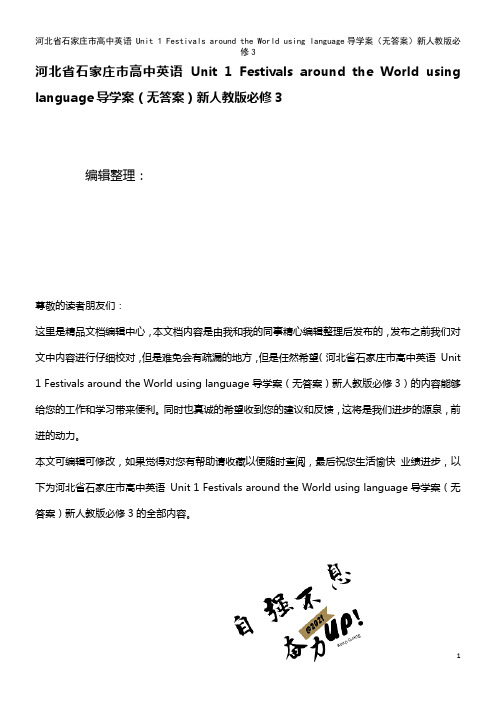
河北省石家庄市高中英语Unit 1 Festivals around the World using language导学案(无答案)新人教版必修3编辑整理:尊敬的读者朋友们:这里是精品文档编辑中心,本文档内容是由我和我的同事精心编辑整理后发布的,发布之前我们对文中内容进行仔细校对,但是难免会有疏漏的地方,但是任然希望(河北省石家庄市高中英语Unit 1 Festivals around the World using language导学案(无答案)新人教版必修3)的内容能够给您的工作和学习带来便利。
同时也真诚的希望收到您的建议和反馈,这将是我们进步的源泉,前进的动力。
本文可编辑可修改,如果觉得对您有帮助请收藏以便随时查阅,最后祝您生活愉快业绩进步,以下为河北省石家庄市高中英语Unit 1 Festivals around the World using language导学案(无答案)新人教版必修3的全部内容。
Unit 1 Festivals around the WorldSection III Learning about language & Using language学习目标1.理解文章大意,通过对carnival、情人节等一些节日的学习,加强跨国文化意识.2.识记并运用:列出本节课所需掌握的单词、句式。
学习重难点1.短语:after work meet sb. at the coffee shop turn uplaugh at keep one’s word look forward to ~ingall day be alone with sb。
be like a foolhold one’s breath it is obvious that…wait for…to leavewipe the table a weaving girl a herd boyfall in love with get married secretly once a yearset off for home on the seventh day of the seventh lunar month2.句式:It be+______ (possible, strange, natural, important...)+that从句学法指导快速阅读,准确阅读学习过程Task 1:语篇领悟I. Warming up : What is a carnival?II. ListeningThere is a big and famous carnival in Trinidad every February. Li Mei and Wu Ping are there. Listen to the tape and answer the questions on page 6.III。
高中英语 Unit 1 Festivals around the world Period One

Unit 1 Festivals around the worldThe Chinese Spring Festival2016 Chinese New Year falls on February 8.It is a great chance to experience the traditional Chinese folk customs!The Chinese New Year,also called the Spring Festival,has more than 4,000 years ofhistory.Being one of the traditional Chinese festivals,it is the most important festival for Chinese people.Starting in the Shang Dynasty (about 17th-11th century BC),it celebrates family reunion and hopes the advent of spring.People from different regions celebrate it in their unique ways.It is said that the custom of the Chinese New Year started in the last month of the Chinese lunar calendar when people offered sacrifice to their ancestors.At that time,people prepared the sacrifice by doing thorough cleaning,having bathes and so ter,people began to worship different deities as well on that day.The sacrificing time changed according to the farming schedule and was not fixed until the Han Dynasty (202 BC-220 AD).The custom of worshipping deities and ancestors remains even though the ceremonies are not as grand as before.It is also the time that spring is coming,so people hold all kinds of ceremonies to welcome it.There are many legends about the Spring Festival in Chinese culture.In folk culture,i t is also called “guonian〞in Chinese.It is said that the “nian〞 was a strong monster which was fierce and cruel and ate one kind of animal including human beings a day.Human beings were scared about it and had to hide in the evening when the “nian〞 came ter,people found that “nian〞 was very scared about the red colour and fireworks.So after that,people use red colour and fireworks or firecrackers to drive away the “nian〞.As a result,the custom of using red colour and setting off fireworks remains.Notes1.advent n.(重要人物、事件等的)到来,出现2.sacrifice n.祭品;牺牲;v.牺牲;献祭3.worship vt.& n.敬奉(神);拜神4.deity n.神5.legend n.传说,传奇6.monster n.怪物Task判断正(T)误(F)1.The Spring Festival in China dates back to the Tang Dynasty.(F)2.The custom of worshipping deities and ancestors remains today.(T)3.Nian,the monster,is afraid of red colour and fireworks in legend.(T)Period One Warming Up,Prereading & ReadingⅠ.单词检测1.harvest n.& vt.& vi.收获;收割2.celebration n.庆祝;祝贺celebrate v.庆祝3.starve vi.& vt.(使)饿死;饿得要死4.origin n.起源;由来;起因5.religious adj.宗教上的;信奉宗教的;虔诚的6.ancestor n.祖先;祖宗7.belief n.信任;信心;信仰8.trick n.诡计;恶作剧;窍门;vt.欺骗;诈骗9.arrival n.到来;到达;到达者arrive v.到达10.gain vt.获得;得到11.independence n.独立;自主independent adj.独立的;自主的12.gather vt.& vi.搜集;集合;聚集13.agriculture n.农业;农艺;农学agricultural adj.农业的;农艺的14.award n.奖;奖品;vt.授予;判定15.admire vt.赞美;钦佩;羡慕16.energetic adj.充满活力的;精力充沛的;积极的energy n.精力;活力;能量Ⅱ.短语检测1.take place发生2.in memory of 纪念;追念3.dress up穿上盛装;打扮;装饰4.play a trick on 搞恶作剧;诈骗;开玩笑5.look forward to期望;期待;盼望6.day and night日夜;昼夜;整天7.have fun with 玩得开心Ⅰ.阅读课文,判断正(T)误(F)1.Most ancient festivals were celebrated because of religions.(F)2.In Mexico,people celebrate the Day of the Dead,eating cakes with “bones〞 on them.(T)3.Japan’s Cherry Blossom Festival comes later than the Day of the Dead in Mexico.(F) Ⅱ.课文阅读理解1.What’s the main idea of the passage?A.Festivals have many origins.B.Festivals are held to honour the dead and famous people.C.Festivals are held for happy events.答案 A2.In ancient times,people would celebrate .A.when winter endedB.if food was difficult to findC.during the cold winter months答案 A3.Which of the following is NOT the festival to honour the dead?A.The Japanese festival Obon.B.The Western holiday Halloween.C.Japan’s Cherry Blossom Festival.答案 C4.Which of the following festivals is NOT mentioned in the passage?A.Columbus Day.B.MidAutumn Day.C.Christmas Day.答案 C5.What can we infer from the passage?A.People would have feasts,sing and dance at all festivals.B.People celebrate festivals because they don’t want to work.C.By celebrating festivals,people are developing the culture and customs. 答案CⅢ.课文阅读填空People are grateful because their food is gathered for the winter and the agricultural work is over.句式分析:本句是一个复合句。
教案5:Unit 1 Festivals around the world

Unit 1 Festivals around the worldThe First PeriodTeaching Aims:1. Learn the following words and phrases:dress up, in memory of , arrival ,.2. Train the students’ speaking and listening abilities.3. Learn to talk about festivals, customs and habits.Teaching Important Point:Improve the students’ speaking and listening skills by talking about and listening to something about festivals.Teaching Difficult Point:How to further develop the students’ speaking and listening skills.Teaching Methods:1. Pair work and group work to train the students’ speaking ability.2. Listening and choosing activity to train the students’ listening ability.Teaching Aids:1.Pictures2. a projector3. a tape recorderTeaching Procedures:Step Ⅰ. GreetingsGreet the whole class as usual.StepⅡ. Free Talk and Lead-in1.Ask the students to talk about the Spring Festival in China.2.Ask about some other festivals, such as: Lantern Festival, the Dragon Boat Festival,Harvest Festivals, Mid-Autumn Day, New Year’s Day…3.Ask about so me foreign festivals, such as: Christmas Day, Thanksgiving Day, Mother’sDay, April Fool’s Day, Valentine’s Day…StepⅢ. Warming up1.Look at the pictures and discuss the three questions.⑴.Do you know the names of the festivals?⑵.Do you know which countries the festivals come from?⑶.What are the people in the pictures doing? Why are they doing this?2.Ask the students to think of a Chinese festival and a foreign festival, and then work inpairs to compare them..StepⅣ. Listening1.Do a listening and choosing exercise about the following three festivals: MardiGras, Ramadan and Easter.2.Ask the students to work together to describe one of their favourite festivals.StepⅤ. Speaking1.Ask the students if they would like a new holiday, and ask them to decide what a newholiday should be about.2.After the students prepare for a while, teacher asks some students to talk about their newholiday separately.Step Ⅵ. Summary and Homework1.Ask the students to remember the festival and learn to use them..2.Try to collect more information about festivals and prepare for next part.The Second PeriodTeaching Aims:1.Learn and master the following words: feast, ancestor, awards,gathered, look forward to2.Train the students’ reading ability.3.Let the students learn about the relation between festivals and history and culture.Teaching Important Points:1.Improve the students’ reading ability.2.Help the students learn about foreign history and culture by reading about festivals. Teaching Difficult Point:How to help the students understand the passage exactly.Teaching Methods:1.Discussions before reading and after reading to make the students interested in what theywill read and further understand what they have read.2.Fast reading and careful reading to understand the passage correctly.3.Pair or group work to make the students take an active part in the activities in class.Teaching Aids:1. a TV set and a VCD2. a projector3. a recorderTeaching Procedures:StepⅠ. GreetingsGreet the students as usual.StepⅡ. Discussion and Lead-in1.Watch a program about a festival.2.Ask the students to talk about the program.3.Ask the students to discuss the questions below.﹙four questions﹚4.Learn the new words in the passage.StepⅢ. Reading1.Ask the students to read the passage silently and quickly to get the general idea.2.Ask the students to answer some questions.﹙three questions﹚3.Re-read the passage carefully to further understand it. Then work in groups of four todiscuss some questions.4.Read aloud the passage and try to understand it better.StepⅣ. Listening and ConsolidationAsk the students to listen to the tape and finish the “true” or “false” exercise on Page11. StepⅤ. Summary and HomeworkPreview next part— Language study.The Third PeriodTeaching Aims :1.Review the new words appearing in the last two periods.2.Learn to use the modal verbs — must, have to, have got to.Teaching Important Points:1.Learn to guess the missing word according to the given sentence.2.Master the modal verbs correctly.Teaching Difficult Point:How to use “must”, “have to”, “have got to” properly and how to use their negative forms correctly.Teaching Methods:1.Practice and consolidate the words learned in the last two periods.2.Giving examples to explain the difference between “must” and “have to” and thedifference between “mustn’t” and “don’t have to”.3.Making sentences to consolidate the usages of the modal verbs.Teaching Aids:1. a projector2.some slides3.some picturesTeaching Procedures:StepⅠ.GreetingsGreet the whole class as usual.StepⅡ. Revision1.Ask the students to review something about Kwanzaa, such as the birth of it, thepurpose of it, the way of celebrating it, and the seven principles of it.2.Ask students some questions about the passage.3.Find the right explanation for each of the words.﹙nation, faith, determination,purpose, generation, ancestor, peace trick﹚4.Word Study. Ask the students to choose the best word to fill in each blank.StepⅢ. Grammar1.Modal Verbs: must, have to, have got to.2.The negative forms of the modal verbs.3.Do the exercises4.StepⅣ. PracticeDo the exercisesStepⅤ. Summary and Homework1.Review the contents in this class, paying attention to the differences between“must” and “have to” and the difference between “mustn’t” and “don’t have to”.2.Do more exercises to learn to use them properly.The Fourth PeriodTeaching Aims:1.Learn the following words and phrases:reminder, care about, respect, cycle, fool, play tricks on, take in, invitation2.Review the language points and modal verbs in this unit.3.Train the students’ integrating skills, especially writing skill.Teaching Important Points:eful expressions: care about, play tricks on, take in2.Practice expressing and supporting an opinion.3.Write an invitation.Teaching Difficult Points:1.How to create a festival and describe it.2.How to write an invitation.Teaching Methods:1.Review method to consolidate the language points of this unit.2.Individual, pair or group work to finish the reading and writing tasks.Teaching Aids:1. a projector2.some slides3.Teaching Procedures:StepⅠ. GreetingsGreet the whole class as usual.StepⅡ. Revision1.Review the usages of the modal verbs learned before.2.Read about some other festivals. Besides, ask the students to create a festival and thenwrite an invitation to invite their guests to their festival.StepⅢ. Reading1.Read some information about each festival .2.Ask the students some questions about the festivals in the passage.﹙four questions﹚3.Learn some useful expression in the passage.﹙care about, play tricks on / play a trick on,take in﹚4.Give the students some more time to re-read the passage and discuss the questions afterthe passage with their partners, and then check them out.StepⅣ. Writing1.Ask the students to finish the contents mentioned on Page 8. Then write a shortdescription of their own festival. At the end, tell their classmates about their festival. StepⅤ. Summary and Homework1.Practice reading and writing about festival.2.Learn more about festivals, customs and habits of foreign countries。
最新-重庆市綦江实验中学校高中英语必修三:unit 1 festivals around the w
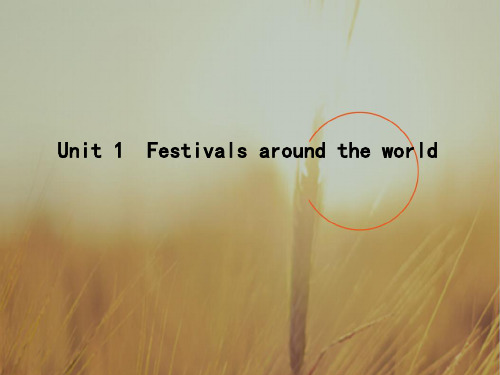
.
A.Chinese B.Japanese
C.Christians D.Americans
答案:1.C 2.B 3.C
课堂讲练 Warming Up 1.Discuss when they take place,what they celebrate and what people do at that time. 讨论它们(中国节日)在什么时间举行,庆祝的是什么事件,人们在那天做 什么事。(P1) ◆ take place 发生 In 2022 the Winter Olympic Games will take place in Beijing and Zhangjiakou. 在2022年,冬奥会将在北京和张家口举行。 The idea comes from a small incident that took place last month. 这个想法来自上个月发生的一件小事。
take the place of代替 归纳拓展 take one’s place 入座;替代某人
in place of sb.=in one’s placee,happen,break out,occur,come about ①take place 发生、举行、举办。一般指非偶然性事件的“发生”,即这种事件的发生一定有某
to sb./It occurs/occurred to sb.that...“某人突然想起……” ⑤come about表示“发生、产生”,多指事情已经发生了,但还不知道为什么,常用于疑问句和否
定句。 Great changes have taken place in that area in the past ten years.在过去的十年中 那个地区发生了巨大的变化。 The accident happened at 7:50 am on Jiqing Highway. 上午七点五十分,事故发生在济青高速公路上。 He was born just four months before the war broke out. 他在战争爆发前四个月出生。 It occurred to me that she must have known the news. 我突然想到,她一定是知道了那个消息。 They didn’t know how the change had come about. 他们不知道这个变化是怎样产生的。
- 1、下载文档前请自行甄别文档内容的完整性,平台不提供额外的编辑、内容补充、找答案等附加服务。
- 2、"仅部分预览"的文档,不可在线预览部分如存在完整性等问题,可反馈申请退款(可完整预览的文档不适用该条件!)。
- 3、如文档侵犯您的权益,请联系客服反馈,我们会尽快为您处理(人工客服工作时间:9:00-18:30)。
Unit 1 Festivals around the worldLanguage Points导学案3Period 3 Language points 1Learning aim Learn and grasp the usages of some important new words and expressions Learning important pointUse some useful words and expressions correctlyLearning difficult point.Make sentences after the useful sentence patterns.使用说明及学法指导:1 Discussing, summarizing and practicing2 Cooperative learning课前预习案Previewing CaseTask 1 词汇拓展1.________n. 美人;美→__________ adj. 美丽的→_______ vt.美化2._______ n.庆祝→ __________ vt.庆祝3.__________vi. & vt.(使)饿死;饿得要死→__________ n. 饿死4. _________ adj.宗教上的;信奉宗教的;虔诚的→ __________n.宗教5. _________n.信任;信心;信仰→ ________ vt.相信6._________n.到来;到达;到达者→ _______vt.到达7.________ n.独立;自主→ ________ adj.独立的;自主的8._________ vt.赞美;钦佩;羡慕→ ________ n.赞美;羡慕9._________ n.许可;允许→________vt.允许→________ n.执照;许可证10.__________vt.道歉;辩解→ ____________ n.道歉Task 2高频短语1._____________发生2.________________ 纪念;追念3._____________ 盛装;打扮;装饰4._____________ 搞恶作剧;诈骗;开玩笑5.______________ 期望;期待;盼望6.________________ 日夜;昼夜;整天7._____________ 好像8._____________ 玩得开心9.___________ 出现;到场Task 3背诵句型1. The most energetic and important festivals are the ones that look forward to the end of winter and to the coming of spring. 最富有生气而又最重要的节日,就是告别冬天、迎来春天的日子。
句型The most...is the one that...最……就是……Translation: 最紧张不安的时刻就是等待结果时。
___________________________ 2.Festivals are meant to celebrate important times of year. 节日就是庆祝一年中重要的日子。
3.At that time people would starve if food was difficult to find, especially during the cold winter months.在当时,如果食物难以找到,人们就会挨饿,特别是在寒冷的冬4.The country, covered with cherry tree flowers, looks as though it is covered with pink snow.整个国度到处是盛开的樱花,看上去就像覆盖了一层粉红色的雪。
课堂探究案Exploring Case探究一Words & phrases1. 原文再现:Festival are meant to celebrate important events.节日就是庆祝重要事件的活动。
1). mean doing sth._________ e.g This means staying here longer. 这意味着要呆在这里更长。
2). mean to do sth. ______________ e.g What do you mean to do with it? 你打算拿它怎么办?3). mean sth to sb _______________e.g I love you, you mean the whole world to me. 我爱你,对我来说你就是整个世界。
Translation:1)我不是有意冒犯你。
(offend)_______________________2)错过这班车就意味着要走路回家。
_____________________3)你的友情对我来说很珍贵。
_____________________2. 原文再现:At that time people would starve if food was difficult to find.→starve vi.& vt.(使)饿死,饿得要死starvation n.饥饿,挨饿,饿死*starve for=be dying for _______ *starve to death_________ *die of/from starvation________ *starve sb. into (doing) sth. 断绝食物(或资金)以迫使某人做某事(1)Millions will _______ (面临饥饿的威胁) next year as a result of the drought.(2)They got lost in the desert and __________________ (饿死).(3)The measures were aimed at ________________(断绝这个国家的经济以迫使它屈服).(4)The money has run out; they ___________________(渴望得到一大笔钱) to finish the work.3. 原文再现:Some people might win awards for…→award. n. 奖, 奖品v. 判给, 授予(后接双宾语)*I award an apple to my daughter.= I award my daughter an apple . 归纳出:_____________*She was awarded a medal for bravery.她因勇敢而获得奖章。
归纳出短语:__________*Ma Guoming won/received/got an award for his excellent acting skill. 马国明因他出色的演出获得了奖。
归纳出短语:____________________Translation:1.他因发明了机器人而获得了奖。
__________________________________________________2.她因成为最好的歌手被授予一等奖。
______________________________________________3. 妈妈奖给我一个吻。
___________________________________________________________4. 原文再现:In the USA, Columbus Day is in memory of the arrival of …→in memory of 纪念翻译:①The museum was built in memory of the famous scientist. _______________________.②他写了一首感人的长诗来纪念他的妻子。
_________________________________________. 拓展:in+n.+of 短语in praise of 歌颂in honor of _______in favor of ___in charge of ____in search of ____in place of ___in hope of ____[即学即练]用in+n.+of 短语填空。
(1)This is a book ____________________the construction workers.(2)We are all ____________________ your plan.(3)They started off at once ____________________the missing girl.(4)A great banquet was held ____________________ our distinguished guests.(5)We use chopsticks ___________________ knives and forks.(6)Shang Zhi is the chief commander who was _____________ the launch of Shenzhou Ⅵ.5. 原文再现:The most energetic and important festivals are the ones that look forward to the end of winter and to the coming of spring. →look forward to 期望;期待;盼望[即学即练](1)我妈妈说她正期待着与你见面。
______________________________________.(2)I was _______________ his comments on this new film.我期待听到他对这部新影片的评论。
提示:look forward to 结构中的to为介词,其后接名词或动名词。
类似的动词短语还有:be/become/get used to 习惯于……pay attention to ___devote...to... ___lead to ___object to ___prefer...to... ___contribute to ________探究点二Sentence focus重点句型详解1. 原文再现:The country, covered with cherry tree flowers, looks as though it is covered with pink snow.整个国度到处是盛开的樱花,看上去就像覆盖了一层粉红色的雪。
